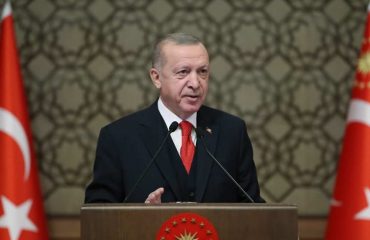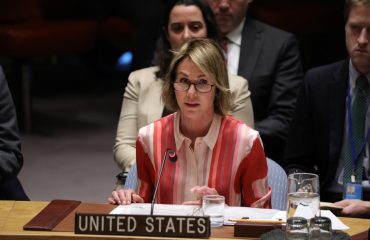

“This electoral victory of New Democracy Party leader Kyriakos Mitsotakis also proved that it is not necessary to base the campaign on the “Turkish threat” to win elections in Greece. There were no Aegean, Cyprus, or Mediterranean crises during the election process in both countries, but Mitsotakis won.”
The second round of elections in Greece took place on Sunday, June 25, ending two months of the election marathon. The result was no surprise. As predicted, the New Democracy Party, led by Kyriakos Mitsotakis, won 40.3 percent of the votes and 158 parliamentary seats, giving it the majority to form a government on its own. Having 155-160 deputies in the 300-member Greek parliament means a comfortable majority for the ruling party. Unlike in Turkey, most of the opinion polling companies predicted the election results exactly.
This electoral victory also proved that it is not necessary to base the campaign on the “Turkish threat” to win elections in Greece. There were no Aegean, Cyprus, or Mediterranean crises during the election process in both countries, but Mitsotakis won.
The lowest turnout in years
The turnout rate for the June 25 elections was 52.8 percent. This means that one out of every two people did not go to the polls. (To compare, the turnout in the May 28 Turkish elections was more than 84 percent.)
This turnout, the lowest since the 1974 junta rule, must have upset the Greeks, who are proud of being the cradle of democracy. But for those who have lived in Greece, this result is not surprising at all. If you ask Greeks on the street, “What is more important to you, voting or a sea vacation on the islands?” I am sure that more than half of them would prefer a sea vacation.
The unstoppable rise of the right
Greece seems to have had its share of the global rise of the right in the recent elections. Three of the 8 parties (Spartans, Niki, and Greek Solution) that managed to pass the 3 percent threshold and enter the Parliament represent the extreme right. The biggest loser of the elections is the main opposition SYRIZA, once the ruling party, whose votes dropped from 31 percent to 17 percent compared to the 2019 elections.
“We were defeated but not crushed,” Alexis Tsipras said, familiar words to me from the Turkish elections.
The combined votes of the three parties on the left (SYRIZA, PASOK, and the Communists) do not reach the votes of the first party New Democracy alone. With these elections, the picture we have seen for years in Türkiye across the political spectrum has emerged for the first time in Greece: 65 percent right-wing and 35 percent left-wing.
Mitsotakis and Erdoğan tactics
Less than 24 hours after the polls closed on June 25, the official results were announced. President Katerina Sakelaropoulou gave office to Mitsotakis, he was sworn in with his hand on the Bible in the presence of priests, and the new government was announced on the evening of June 26. This must be a speed record for Greece, notorious for its slow-moving bureaucracy.
The new Cabinet consists of 24 ministers and 7 deputy ministers. Seventeen of them were also in the previous government.
It seems that Mitsotakis has learned something from President Tayyip Erdoğan in politics; he does not offend anyone. Those he has kept on the sidelines for a while, he brings back to the stage. He reshuffled the existing ones. He pays attention to the balance within the party.
It is possible to see the traces of Karamanlis and Samaras in the new government. For example, Adonis Samaras’ Minister of Tourism and Culture Olga Kefalogianni, who attracted the attention of tabloid journalists in Turkey more than diplomatic reporters at the time, has been reinstated as Minister of Tourism.
Former Foreign Minister Nikos Dendias, who complained about Turkey to the stones and birds in the mountains on every occasion, was moved to the Ministry of National Defense. The new Greek Foreign Minister is Giorgos Gerapetritis, who, like his Turkish counterpart, former intelligence chief to Erdoğan, Hakan Fidan, is regarded as the secret keeper of Mitsotakis.
Nationalist discourse and the Turkish minority
Perhaps because he saw that nationalist rhetoric had helped President Erdoğan get elected, Mitsotakis increased his vote share by bringing the Turkish minority on his agenda in the last week of the election campaign.
On the other hand, the only constituency where New Democracy failed to get an MP was Rhodope in Western Thrace. It is pleasing for Ankara to see that Western Thrace Turks will be represented in the Parliament this time with four MPs. However, all four are from the opposition SYRIZA and PASOK. There is no one from the ruling New Democracy Party among them. The fact that Western Thrace has long been seen as a vote depot for the opposition does not help in finding solutions to the problems of the minority.
Erdoğan- Mitsotakis meeting
Let’s touch wood on the Greek-Turkish rapprochement that started with the February 6 earthquake in Türkiye, which did not deteriorate yet. On the contrary, it was further strengthened by confidence-building measures such as planned war drills being transformed into only shooting exercises and mutual phone calls.
Mitsotakis, who was ignored by President Erdoğan two years ago after his speech to the US Congress, has come back to life.
All eyes are now on the Erdoğan – Mitsotakis meeting in Vilnius during the NATO Summit on July 10-11.
Both sides should learn the lessons of the past and go to Vilnius well-prepared.

